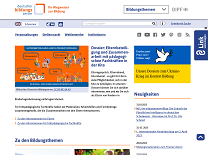Unesco Institute of Statistics: Netherlands – english information https://www.bildungsserver.de/bisy.html?a=8765&spr=1
The Unesco Institute for Statistics (UIS) provides the most recent basic data on education in the Netherlands. You will find information on the following issues: * General information * Education System * Participation in education * Progression and completion in education * Education expenditures * Illiterate population * Literacy Rate Furthermore you will find extra sections and statistics for the following topics: Science, Technology And Innovation as well as Culture. [Abstract: Editors of Education Worldwide]

